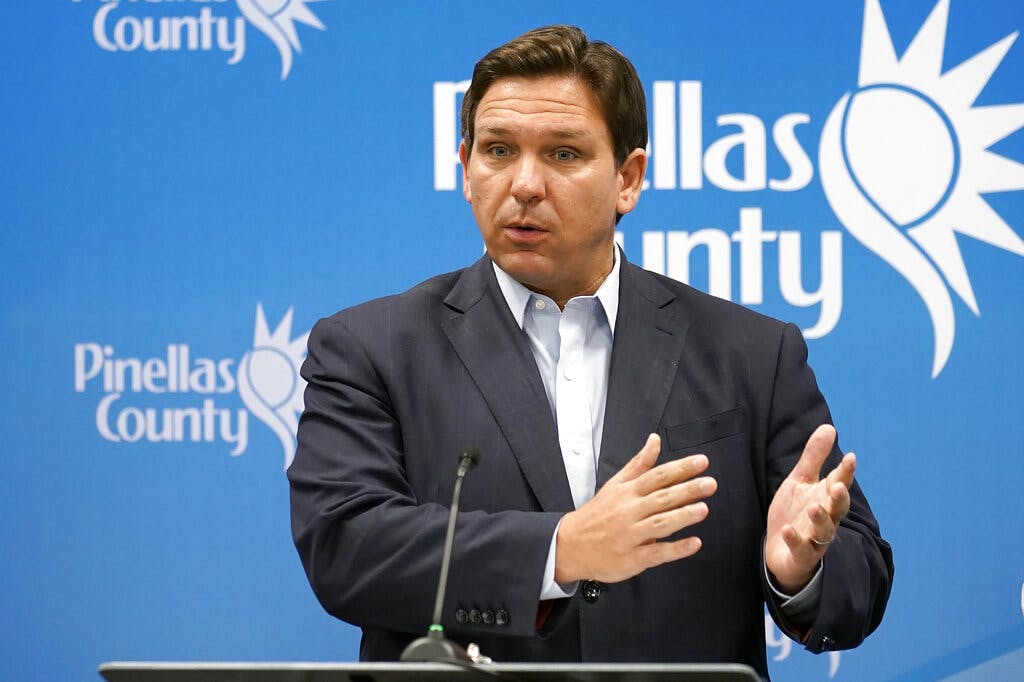DeSantis Navigates Rough Seas on Fiscally Responsible Storm Aid
Championing fiscal responsibility can’t hurt the Florida governor with voters suffering the impact of runaway spending.

As Florida cleans up after Hurricane Ian, partisans are leveling charges of hypocrisy against Governor DeSantis, a Republican who sought oversight on relief for 2012’s Superstorm Sandy. But championing fiscal responsibility can’t hurt him with voters suffering the impact of runaway spending.
“I sympathize with the victims of Hurricane Sandy,” Mr. DeSantis, then a congressman, wrote in a Facebook post after the storm, “and believe that those who purchased flood insurance should have their claims paid. At the same time, allowing the program to increase its debt by another $9.7 billion with no plan to offset the spending with cuts elsewhere is not fiscally responsible.”
It’s the sort of stance cheered by Americans facing 40-year-high inflation, as was Mr. DeSantis taking issue with the fact that only a fraction of the Sandy spending would go to immediate relief for people like my parents whose home at the Jersey Shore was flooded by the combination of high tide, rain, and wind.
The White House chief of staff for President Obama, Rahm Emanuel, said in 2008, “You never let a serious crisis go to waste, and what I mean by that is it’s an opportunity to do things you think you could not do before.” This is the mentality that took hold on Capitol Hill after Sandy and is back now.
According to a 2012 NBC News analysis, the bill promising Sandy relief included millions for pet projects such as the National Air and Space Museum, NASA, and the Smithsonian. None of that so-called relief helped our neighbors who had their businesses, hopes, and dreams washed into the sea.
Few in Congress are brave enough to kick the tires of packages dubbed “relief.” The images of destroyed homes and heart-wrenching stories of families who lose everything make bean counters walk small, even if spending our beans with care is what voters expect when they pay taxes.
Mr. DeSantis’s problem with the Sandy package, he explained in an interview, was that “only 30 percent of it was going to be spent in the first two years” and it included “things that could not in any way be said to be emergency spending. It just was so much extraneous stuff.”
He felt a leaner package “focused on immediate relief, not spending down the line that’s not necessary … would have been a better way to go about it.” He also said, “I never made the point of saying we shouldn’t do anything,” and that he’d be consistent in wanting to see a bill for Florida hurricane relief before supporting it.
During Sandy, New Jersey’s Republican governor, Christopher Christie, lambasted the GOP House, led by Speaker Boehner, decrying “the toxic internal politics of the House majority” in working over the relief package to ensure it got to the people who needed it.
Later, as if to prove Mr. DeSantis’s concerns about how the money would be spent, Mr. Christie faced a federal investigation over his $25 million “Stronger than the Storm” ad campaign, casting himself as a hero as he sought reelection and eyed a run for president.
The audit found that the state “did not procure services and products for its tourism marketing program in a manner that met the intent of all federal procurement requirements.” That the funds were never meant to shout, “Greetings from Asbury Park, New Jersey,” to vacationers was, by then, an afterthought.
Mr. DeSantis is now a governor with no role in crafting the Ian package. He might find flaws in it, too, but if he couldn’t sway a Republican Congress as a member of it, he’d have no hope of influencing a Democratic one from the outside.
If he someday wins the White House, Mr. DeSantis won’t have a vote on spending, either, unless Congress passes the line-item veto that presidents of both parties have long sought. Will signing a future disaster bill on the Resolute Desk make him a hypocrite?
No. It’ll make him a chief executive who recognizes that Congress holds the strings to the national purse, and when they open it in a crisis, there’s nothing anyone can do to stop them from grabbing the bucks they couldn’t get when the sun’s shining.

